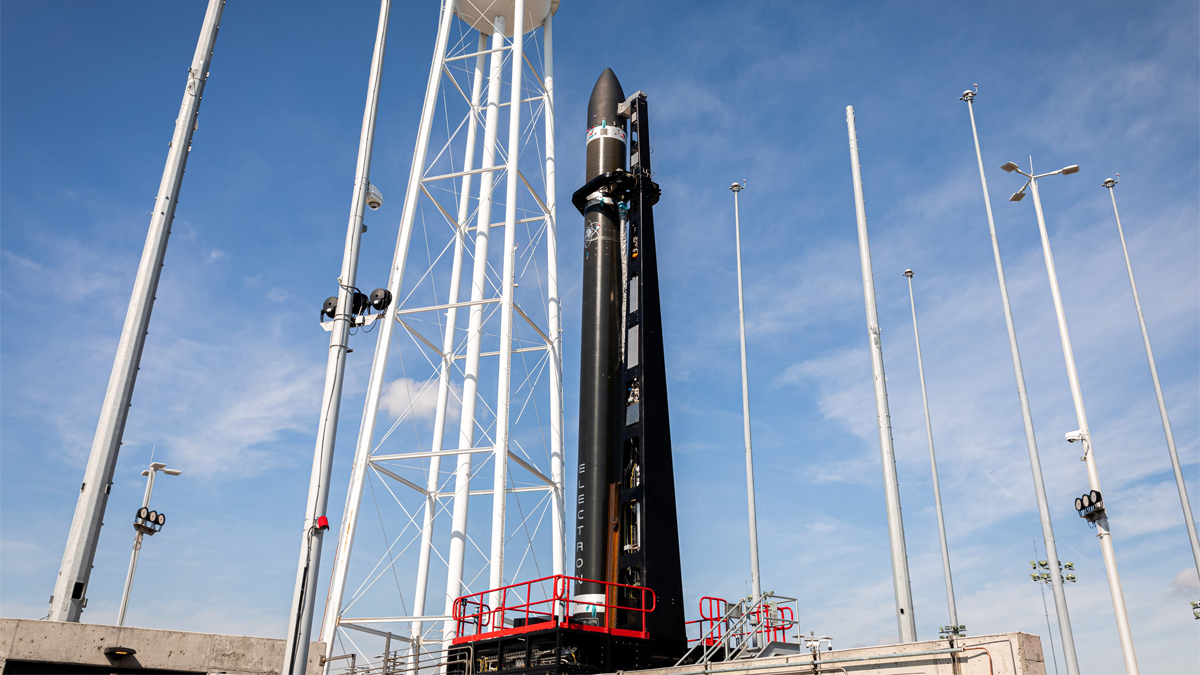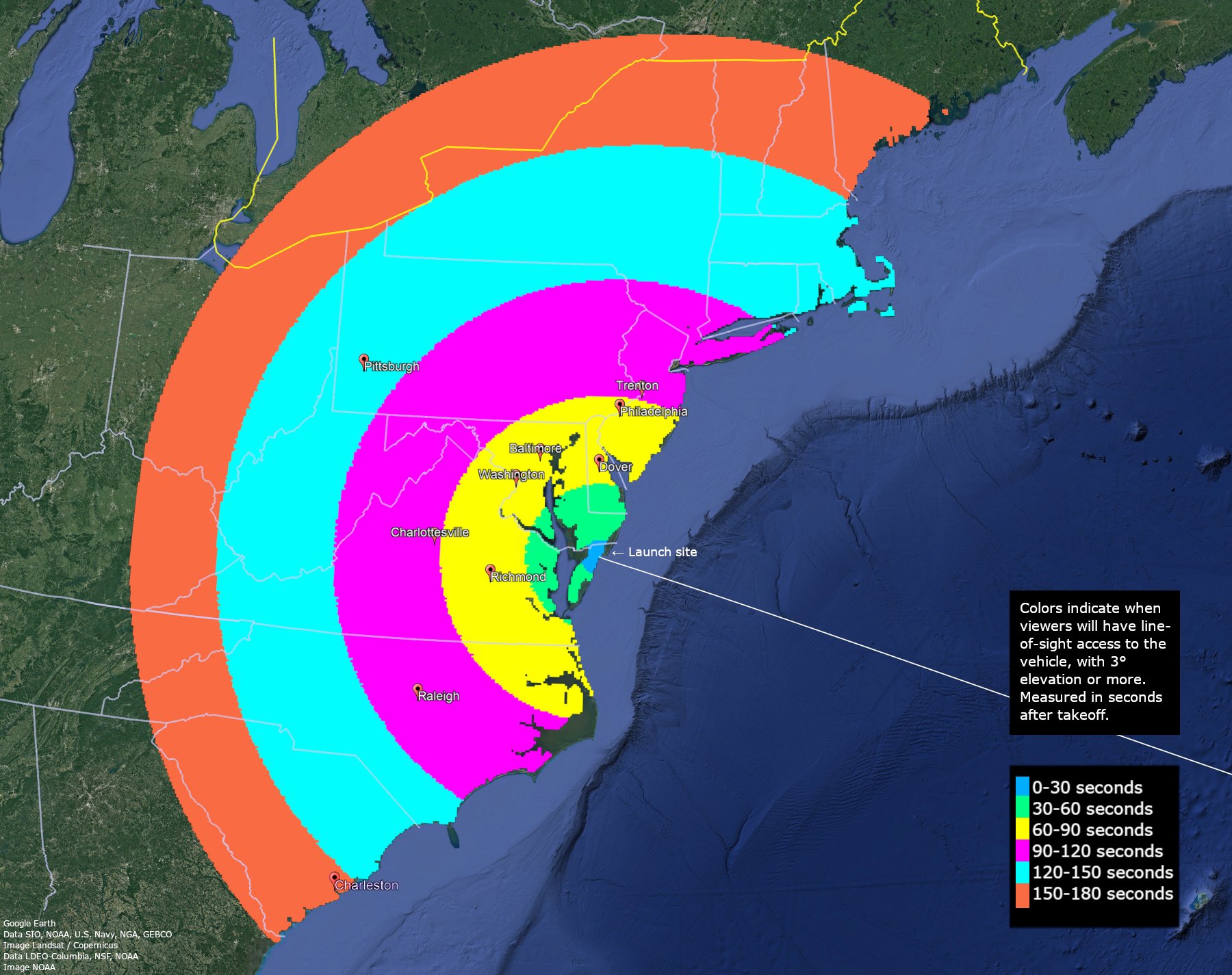Rocket Lab's 1st US launch may be visible along East Coast on Jan. 24. Here's where to look.
Even if you aren't at the launch, you might still be able to watch the Electron rocket send six satellites to orbit.

Update for Jan. 23: Rocket Lab has postponed the launch of its first Electron from the U.S. East Coast to no earlier than Jan. 24. The launch window and visibility guide below are still set for a 6 p.m. EST (2300 GMT) launch from Wallops Flight Facility on that day.
You might be able to catch a glimpse of Rocket Lab's Electron rocket this weekend even if you can't attend the launch.
Rocket Lab's first-ever mission from U.S. soil will light up the skies for much of the East Coast when it launches from NASA's Wallops Island facility in Virginia on Tuesday (Jan. 24). The California-based company has been lofting small satellites to orbit successfully from New Zealand since 2018 and is now set for its first mission from its new U.S. launch pad. This U.S. debut has been delayed since mid-December due to bad weather at the launch site.
Ahead of the launch, NASA's Wallops Flight Facility released a visibility map that shows where and when residents of the East Coast can expect to see the Electron launch. "For those along the East Coast, weather permitting, you may catch a glimpse of Electron's flight. From a distance, Electron will appear like a bright, fast-moving star in the sky," NASA Wallops wrote on Twitter.
Related: Rocket Lab now targeting Jan. 24 for 1st-ever launch from US
That map was created for a two-hour launch window beginning at 6 p.m. EST (2300 GMT) on Tuesday, Jan. 24.
David Pierce, director of NASA's Goddard Space Flight Center in Maryland, said during a Dec. 14 briefing for Rocket Lab's first launch attempts that the launch should provide a great skywatching opportunity.
Breaking space news, the latest updates on rocket launches, skywatching events and more!
"We routinely have folks be able to clearly see our launches from rooftops in the Washington, D.C. area, from Norfolk and also from Philadelphia. So it's going to be a great show," Pierce said.
"And being that it's going to be a night launch, we'll make sure everybody knows there's no UFOs — that we're launching a rocket from Wallops," Piece added.
As seen on NASA Wallops' visibility map, the launch should be visible from Maine down to Georgia, and even as far west as Ohio (as long as weather conditions are clear). The farther one is away from Wallops Island, the longer after launch the rocket should be visible.
For example, viewers in Richmond, Virginia should be able to see the rocket between 60 and 90 seconds after launch; viewers in Ohio, meanwhile, should expect to catch a glimpse between 150 and 180 seconds after launch.
The mission, named "Virginia is for Launch Lovers" (Virginia's tourism slogan is "Virginia is for lovers"), was originally scheduled for Dec. 9 but has been postponed multiple times due to weather and regulation issues with the FAA. Those issues were resolved for a Dec. 18 launch try, but high winds scrubbed the liftoff and pushed the mission in to January 2023. An initial Jan. 23 launch date was pushed back 24 hours due to bad weather.
Rocket Lab's first U.S. launch will loft three HawkEye 360 satellites, which are designed to gather data on radiofrequency transmissions and map their locations. HawkEye 360's customers include the U.S. National Reconnaissance Office (NRO), which is tasked with collecting satellite intelligence and sharing it with the U.S. intelligence community and military intelligence groups at the Pentagon. The company has been granted FAA permits to launch up to 80 satellites through 2034, according to SpaceNews.
Editor's note: This story was updated on Jan. 22 with the new launch date and time for Rocket Lab's upcoming launch.
Follow Brett on Twitter at @bretttingley. Follow us on Twitter @Spacedotcom or on Facebook.

Brett is curious about emerging aerospace technologies, alternative launch concepts, military space developments and uncrewed aircraft systems. Brett's work has appeared on Scientific American, The War Zone, Popular Science, the History Channel, Science Discovery and more. Brett has degrees from Clemson University and the University of North Carolina at Charlotte. In his free time, Brett enjoys skywatching throughout the dark skies of the Appalachian mountains.

